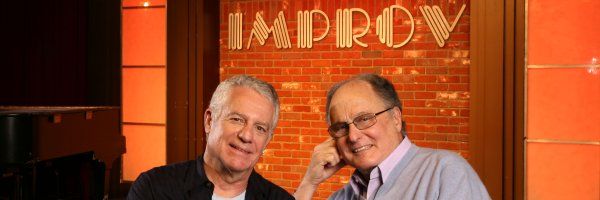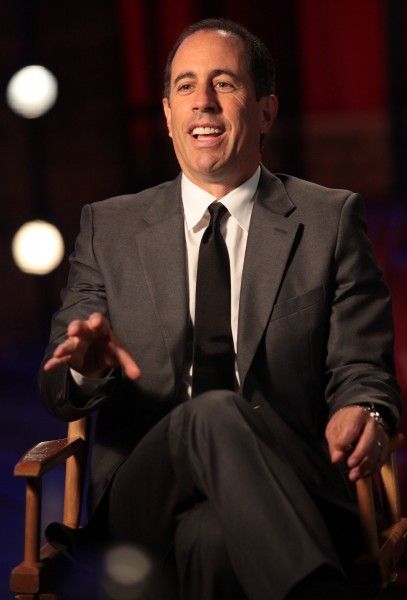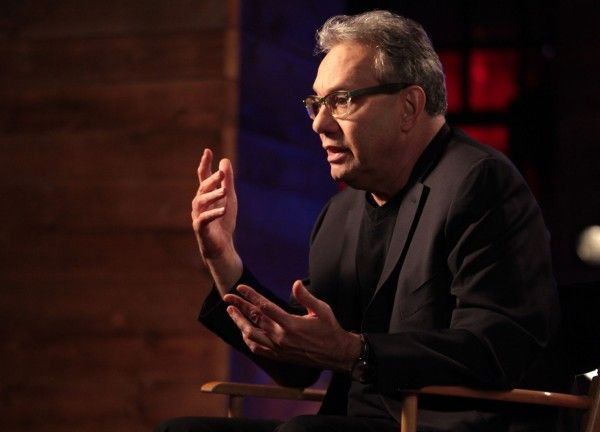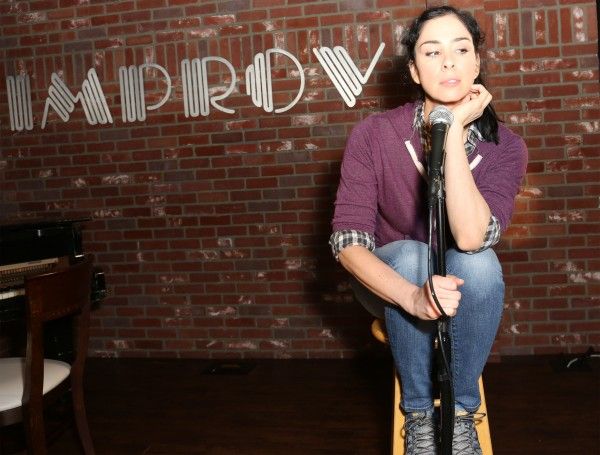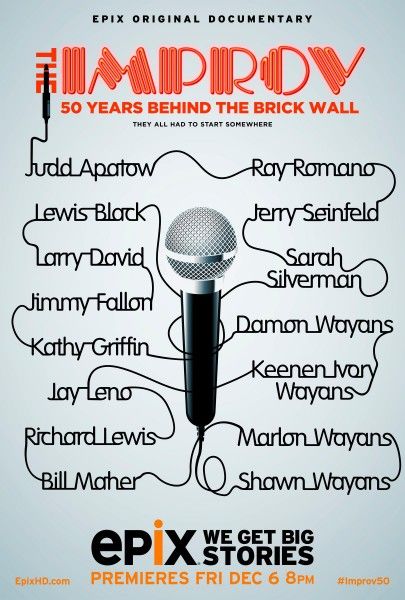EPIX is celebrating 50 years of the famous comedy club in the original documentary, The Improv: 50 Years behind the Brick Wall. The one-hour special, narrated by Adam Sandler, the biggest names in stand-up comedy reveal the role the club played on their road to stardom, through funny personal stories, home movies, photographs and archival footage. The special features Judd Apatow, Lewis Black, Larry David, Jimmy Fallon, Kathy Griffin, Jay Leno, Richard Lewis, Bill Maher, Ray Romano, Jerry Seinfeld, Sarah Silverman and the Wayans brothers.
During this recent exclusive phone interview with Collider, The Improv’s founder Budd Friedman talked about how this EPIX documentary came about, how proud he is of the impact The Improv had on the comedy business, how he never could have envisioned what The Improv would become, how it evolved from a place for singers to a place for comedians, the memories that he has from the 50 years they’ve been in business, the performances that most stand out for him, and how he would like The Improv to be remembered in 50 more years. Check out what he had to say after the jump.
Collider: How did this documentary come about? Had you been looking to do something for the 50th anniversary?
BUDD FRIEDMAN: Yeah, absolutely! It’s our 50th anniversary and certainly we’d have to commemorate it, in some way. Our producer, Judy Pastore, had worked for EPIX before, and she came up with the idea for doing this for the 50th anniversary. They jumped on board, and then we got it going. The only problem we had was the timing we had to do it fell into the time of renovation of the club, so we couldn’t shoot the interviews at the actual Melrose Avenue club. We had to rent a studio. But I think they did a nice job, making it appear, not like the club, but at least evoking the atmosphere of the club. One of the things that’s so wonderful about this is that it’s the history of The Improv being told by the comics, rather than by me or my partner (Mark Lonow). It’s great!
Were you there to listen to what the comics said?
FRIEDMAN: No, I wasn’t. Maybe it’s better that I wasn’t because they were a little looser. It just so happened that my wife and I had planned a vacation to Europe, and then the dates came out. But, they didn’t need me there. They’re professionals, and my partner, Mark Lonow, was there. I just took it easy. And then, I came back and saw some rough cuts, and thought it looked pretty damn good.
The Improv revolutionized the comedy business, created life-long friendships for people, and allowed comedic stars a place to really hone their craft. How proud are you, of the hand you had in all of that?
FRIEDMAN: My wife says my ego is developed enough, but I really burst with pride. I [recently went on] Jimmy Fallon’s show. I remember when he came into the club, and he was cute and adorable. We watched him one night and I said, “Eh, nothing.” My wife said, “Go talk to him.” I said, “What do you mean, talk to him? He doesn’t even have an act!” She said, “He’s got something. Go talk to him.” So, I did. He’s so charming that he won me over, and the next thing I knew, we were booking him in Vegas. He wasn’t even the headliner. He was the middle act. And he told the stage manager, “I’ve gotta leave tomorrow. I got Saturday Night Live.” And then, off he went. I have a great deal of pride when I watch these guys. Judd Apatow was a doorman at the club on Melrose. I used to manage Jay Leno, back in New York, and look what he’s accomplished. Sarah Silverman used to play poker with my son. Keenen Ivory Wayans was a doorman at the club. You can imagine that nobody fucked with him. There were people we couldn’t fit on the schedule because EPIX had a tight schedule, for whatever reason. We couldn’t get Billy Crystal, Robin Williams, Bette Midler or Robert Klein, who was our first comic to come out of the club and make it. Unfortunately, we just couldn’t expand it for that long.
When you thought you would just open up a coffee shop with food, could you ever have envisioned what The Improv would become, and what it would still be today?
FRIEDMAN: I knew that, in 50 years, I’d have 22 clubs around the country and that we’d do 400 hours of An Evening at the Improv. I knew all those things, when I opened in 1963. No! I had no idea what it was going to be. I’m not that type of visionary. I know what I like when I see it. I opened the room for singers, originally. It became a comedy room, by wonderful accident, much like most of the things I’ve done and accomplished.
How did it go from a place for singers to a club for comedians?
FRIEDMAN: It was for singers, after Broadway shows, to come in and sing what they wanted to. After about a year, we got a liquor license and a comic walked in. It was coincidental. His name was David Naster, and he was playing the Blue Angel, here in New York, which was the chic club in town. He was a comic’s comic, and he got up and he liked it. He came back the next night with a few other comics who had come to see him. And then, they got up. That’s how it happened. I would rather hear a joke, over and over, than the same song, over and over.
How did the look for the club come about, with the iconic brick wall? Did you have any idea that the brick wall would become as famous as the club itself?
FRIEDMAN: No. I was building the club in 1962, at the height of the Vietnam War, and it was a Vietnamese restaurant, so that wasn’t going to last too long. It had red lacquered wood walls and mirrors, all over the place. I just stripped the wood paneling off, and there was the brick, so we cleaned up the brick. Again, it was an accident.
Has this felt like a long 50 years, or has this 50 years flown by?
FRIEDMAN: The 50 years have really gone by. When I watched the EPIX show, it brought back some wonderful memories. It’s enjoyable! I’m 81 years old, and I still have a smile on my face. Of course, that’s largely due to my wife of 33 years. She makes me smile. But, it’s a great business. I don’t work as much as I did. My partner and I are more involved now in trying to expand the brand itself, with things like this EPIX special, rather than the day-to-day business.
Were there any memories that you had forgotten, that watching this documentary really brought back for you?
FRIEDMAN: Yeah. When Judd Apatow was being interviewed, he reminded me that he met Adam Sandler at The Improv, when Judd was working as the doorman. And then, the Wayans’ brothers reminded me that I wasn’t a very good MC. They said, “Budd thought he’d be telling jokes, but he left the audience stunned. And then, we had to go up and look at blank faces and win them back.” Of course, I’d never forget Richard Lewis, but I loved the interview with him and Larry David. I didn’t realize they had been in camp together. They were delightful. It was nice to see the history of The Improv their all of their eyes, instead of just somebody talking. And Adam Sandler was the narrator.
So, was the audition process really as grueling as the comedians say?
FRIEDMAN: It was, for them, but it was for us, too. I used to do the auditions, in the beginning, and it was grueling. There would be 75 or 100 people, most of whom were just horrendous. Finally, I started to assign that chore to others.
How much did it change things, once money came into play? Was that something that really shifted and changed things?
FRIEDMAN: What happened was that they went on strike at The Comedy Store, at the same time our club seriously burned down. So, they came to me and they said, “We’re not going to strike you.” What I did was take the dining room back and we squeezed in 74 seats, instead of having 200. They said, “When you are open again, we’ll negotiate in good faith,” and I said, “Fine.” It took us nine months to get re-opened. It was a terrible process. I was used to the fact that I was going to be paying the comics, so it didn’t come as a shock to me. It really didn’t change anything because the money was rather insignificant, even by the standards of those days. Jimmy Fallon still has his $8.35 check. But, it meant something to them. I didn’t realize what it meant to them to be paid for their services. That was a shortcoming, on my part. They wanted to feel rewarded, not just by the laughter and applause, and by slapping them on the back.
When that fire happened, did you ever consider packing it in, calling it a day and moving on to something else?
FRIEDMAN: What happened was that, after we got re-opened, I met my wife through a mutual friend. She came to the grand re-opening with her friend, and I was dating her friend, so that didn’t work out to well. She kept coming in, and finally her friend and I split up, and I asked her out. When I married my wife a year later, 33 years ago, business was not good. I was broke. The fire had taken a terrible toll on my economics and I was going to sell the club. My former partner in New York, Chris Albrecht, who went on to become the head of HBO, and a friend of his, Mark Lonow, who was an actor, and another guy were going to buy the club. I said to my future wife, “I’m thinking of selling the club and going into real estate.” Everybody was making money selling houses, in those days. And she very wisely said, “You’ve created something that’s unique. Don’t give it up. Stick with it.” Fortunately, they couldn’t come up with the money that I wanted, which was the piddling sum of $400,000, so we forgot that and broke off talks. A couple of months later, Mark came in. He had moved out to L.A. from New York, and I was still hurting for money. I was also a little depressed with the business. I was looking for somebody to come in and put in a few bucks and become a partner, and so Mark did. We’ve been together, ever since. He helped me a lot, and we’ve done all this franchising around the country. We have 21 other clubs, besides Melrose. It’s worked out very nicely.
With all of the crazy things that went on at The Improv, over the years, are there specific nights or performances that most stand out for you?
FRIEDMAN: Oh, yeah! When I opened in California, Rodney Dangerfield came. He was then a star, but he used to work the club when he was an unknown. So, he got up and performed. And Liza Minnelli, who started singing at The Improv in New York when she was 15, sang after Rodney. And then, Liza’s sister, Lorna Luft, decided to sing, too. I thought she was going to get killed, following Rodney and Liza, but she wiped them out. They were like opening acts for her. She was so surprisingly delightful and talented. I had never heard her sing before. It was just a wonderful night. We also did a 20th anniversary there for Showtime, and Billy Crystal was the host of the party. We had a party in the dining room and the bar, before we went in. Bea Arthur came in and he did his, “You look marvelous, darling!” She was probably about a foot taller than Billy, and she bent him over and kissed him on the mouth, and he didn’t have a choice. The look on Billy’s face was priceless. I’ve never forgotten it.
Of all the comedians that came through the club and performed, were there ones that you instantly knew would become stars, and are there ones that you’re surprised became stars?
FRIEDMAN: That’s a good question. I was very rarely wrong. The only thing was that I would never, ever believe that they would become the major stars that they became. I put Jay Leno on, only because he drove down from Boston, three nights in a row, and drove home. I loved his work. He was so different and so funny. I knew he’d be a star, but as the host to replace Johnny Carson? Never! Jerry Seinfeld was talent, funny and a nice guy, but did I think he’d have a show that I’d still watch, almost every night? No! When I grew up, there was Bob Hope, Jack Benny and George Burns, but they were already stars, by the time I became aware of them. But, I didn’t equate these guys with that. I remember when Robin Williams was doing Mork & Mindy, I was standing in the doorway and there was a lot of paparazzi hanging around, in those days. All of a sudden, they went running down the street and I said, “Where are you going?,” and they said, “It’s Robin Williams!” Robin was there, from the beginning.
It’s been 50 years of The Improv now. In 50 more years, how would you like The Improv to be remembered?
FRIEDMAN: Well, I hope it will still be going. I think we’ve set records already. We’re not in the same location, but it’s the same management. I don’t expect to be around, mind you, in 50 more years, but it’s possible that the club might still be going strong. I’m sure the comedy will be different, and I wish I could say something prophetic now that you could put in a time capsule. But, it doesn’t seem to be anywhere near phasing out, anytime soon, particularly when people like EPIX get behind us and do a special for us. I’m just very happy with my life, and with what’s going on with The Improv.
The Improv: 50 Years Behind the Brick Wall airs on EPIX on Friday, December 6th.

